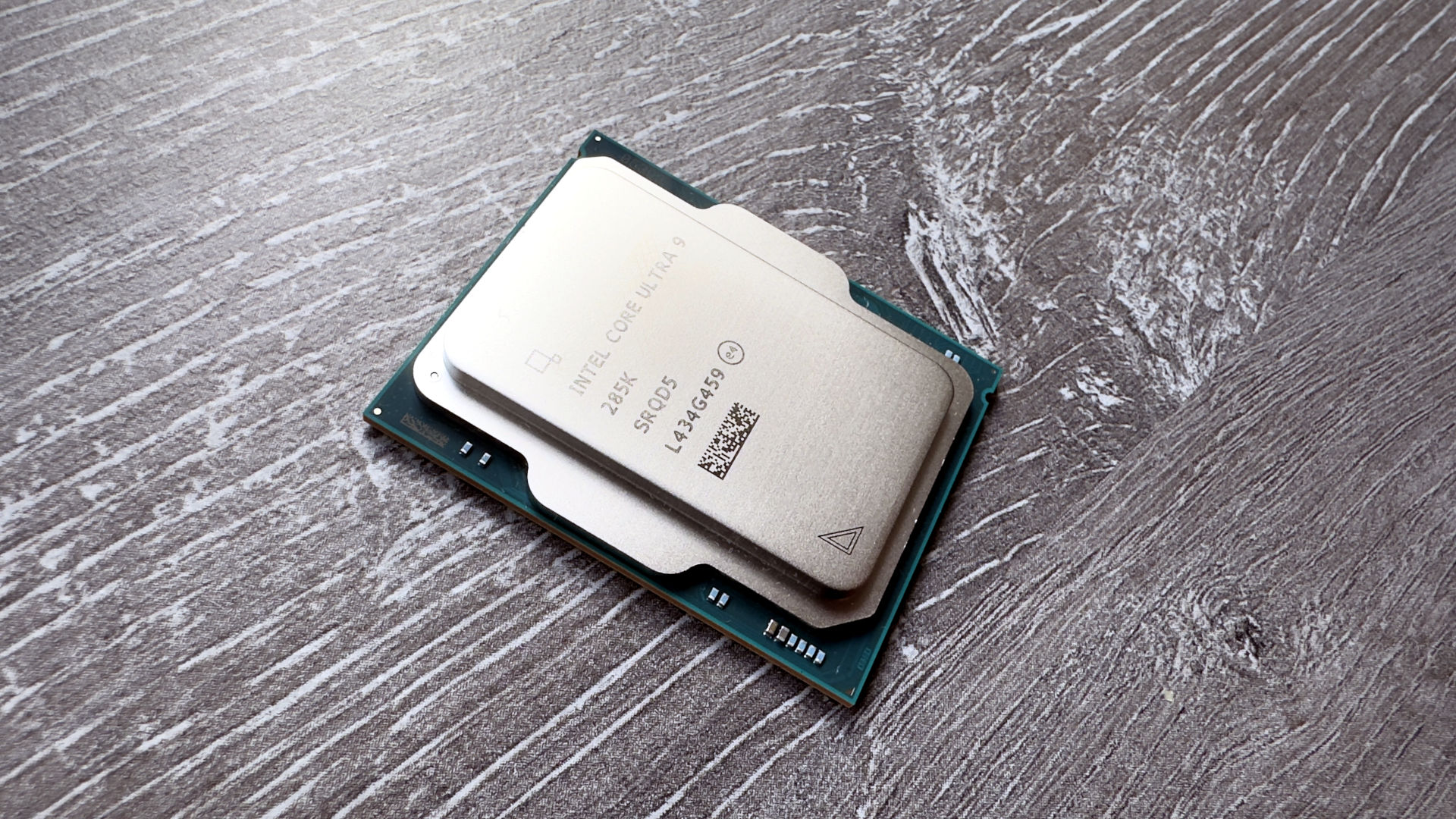Researchers argue that ‘at least 40%’ of the bloated x86 ISA could be removed and emulated to improve CPU efficiency
By Jacob Fox
Copyright pcgamer

Skip to main content
Close main menu
THE GLOBAL AUTHORITY ON PC GAMES
View Profile
Search PC Gamer
PC Gaming Show
Movies & TV
Affiliate links
Meet the team
Community guidelines
About PC Gamer
PC Gamer Magazine Subscription
Why subscribe?
Subscribe to the world’s #1 PC gaming mag
Try a single issue or save on a subscription
Issues delivered straight to your door or device
From£35.99Subscribe now
Borderlands 4
Essential Hardware
Battlefield 6
Don’t miss these
Intel’s patent for ‘software defined super cores’ probably won’t make an appearance in CPUs any time soon but implementing the tech could spell the end of the P-core
My new laptop chip has an ‘AI’ processor in it, and it’s a complete waste of space
TSMC’s next generation of system-on-wafer packaging will make today’s CPUs and GPUs look pathetically feeble in comparison
‘I do not subscribe to the belief that if you build it, they will come’ says Intel’s new CEO, calling past investments ‘unwise and excessive’
Developers of Linux distro Fedora propose dropping 32-bit support entirely, but it’s being claimed that the change ‘would kill off projects like Bazzite entirely’
Graphics Cards
Security mitigations in Intel’s GPUs rob up to 20% of their compute performance but it’s unlikely to be a problem in games
Nova Lake shipping manifest confirms rumours that Intel’s flagship CPU will be packing up to 52 cores, but more cores aren’t all Intel needs
Intel promises ‘leadership across the board on desktop’ when its next-gen Nova Lake CPU launches in late 2026
Ex-Intel and AMD graphics chief Raja Koduri promises a RISC-V based IP that ‘rearchitects the GPU from first principles’ but with few details in the startup word-salad
This tiny version of Windows 11 fits into just 2.29 GB and is ‘extremely aggressive’ in removing bloat such as Xbox, Solitaire and Defender
An Intel Nova Lake leak suggests the next generation of Core Ultra chips will have 60% more multi-threaded performance, but the numbers just don’t add up
Even after performance fixes and price cuts, Intel’s CEO admits that it ‘fumbled the football’ with Arrow Lake CPUs but claims that Nova Lake will fix everything
Just when you thought Intel’s branding couldn’t get any worse, a report says the company plans to outsource marketing to a consultancy using AI
Save Intel’s fabs before ‘the rust of time makes them worthless’: Four former Intel board members want a joint venture between Nvidia, Qualcomm, Google, Amazon, Apple, Broadcom and others to create an ‘American Foundry’
Intel has rebranded the dusty old Core i5 10400 as the Core i5 110, presumably because it found a bunch of them tucked down the back of the couch
Researchers argue that ‘at least 40%’ of the bloated x86 ISA could be removed and emulated to improve CPU efficiency
17 September 2025
They propose a big SHRINK.
When you purchase through links on our site, we may earn an affiliate commission. Here’s how it works.
(Image credit: Future)
The x86 instruction set architecture (ISA) doesn’t seem to be going anywhere. We’ve had people declaring the impending ascent of Arm or RISC-V for years now, and the market hasn’t budged. By and large, people still want to buy Intel and AMD systems running x86 Windows. So, maybe what’s needed isn’t replacement but reform, and maybe that should be in the form of SHRINK.
That’s not a new proposal—the International Symposium on Computer Architecture (ISCA) paper is dated June 2015, coming out of the 42nd annual symposium—but it might be new to you. It was to me. It was brought to my attention by LaurieWired on X, who points out that just 12 of the 1,000+ mnemonics (instructions) on modern CPUs make up 89% of compiled C/C++ code.
And even if we don’t go down the C/C++ route (as some suggest that this might not cover all instruction bases), the SHRINK research paper shows there are lots of unused instructions over time accounting for all bases: “We consider instructions that belong to vector extensions in separate categories [than unused], because albeit unused, they are still under adoption and their UISes are likely to be used in the future.”
Related Articles
Intel’s patent for ‘software defined super cores’ probably won’t make an appearance in CPUs any time soon but implementing the tech could spell the end of the P-core
My new laptop chip has an ‘AI’ processor in it, and it’s a complete waste of space
TSMC’s next generation of system-on-wafer packaging will make today’s CPUs and GPUs look pathetically feeble in comparison
The apparent over-abundance of instructions is often seen as both a boon and a downside to the x86 architecture. It’s very versatile and can do a lot—thus why most consumer apps are built for it and why most home PCs use it—but it doesn’t do it in the most efficient way. That’s led competitors such as Arm to step in with seemingly more efficient chips, albeit chips that can struggle with app compatibility.
The solution to x86’s problem of large swathes of mostly redundant and unused instructions, according to the researchers who made the paper, could be SHRINK, which “provides a method for recycling instructions (i.e., removing unused and/or infrequently-used instructions and strategically reassigning their encodings to more frequently used instructions), and a mechanism to emulate the removed instructions.”
Both Intel CPUs like the one at the top of this article, and AMD CPUs like this one here, use the x86 instruction set architecture (ISA). (Image credit: Future)
The interesting word there is “emulate.” It seems like the idea is that a large chunk of instructions—the lesser-used ones—can be removed from the actual instruction set and instead emulated in software when needed.
The researchers “conclude that at least 40% of the x86 ISA, even after excluding multimedia extensions, could be emulated with minor performance overhead in the analyzed execution traces.”
The biggest gaming news, reviews and hardware deals
Keep up to date with the most important stories and the best deals, as picked by the PC Gamer team.
Contact me with news and offers from other Future brandsReceive email from us on behalf of our trusted partners or sponsorsBy submitting your information you agree to the Terms & Conditions and Privacy Policy and are aged 16 or over.
Other x86 debloating attempts have been made, such as Intel x86s, which sought to remove 16-bit and 32-bit instruction support. This was terminated just last year, though. LaurieWired points out that a big part of the reason why it’s hard to debloat x86 is just because “a lot of it is IP / legal hell.” The x86 ISA isn’t just an Intel product, remember: It’s largely a cross-licensed affair between Intel and AMD. I wouldn’t fancy working through that mire.
And I suppose there’s an argument that debloat isn’t needed, too. While many like to point out the efficiency of Arm chips (for example) compared to x86 ones, we’ve seen in recent years that some x86 chips can be mighty efficient, too. Just look at Intel’s latest Lunar Lake mobile chips.
Still, as my programmer friend would likely remind me, redundant and unused code isn’t a good look. Maybe some SHRINKage wouldn’t be a bad thing.
Best CPU for gaming 2025All our current recommendations
1. Best overall:
AMD Ryzen 7 9800X3D
2. Best budget:
Intel Core i5 13400F
3. Best mid-range:
AMD Ryzen 7 9700X
4. Best high-end:
AMD Ryzen 9 9950X3D
5. Best AM4 upgrade:
AMD Ryzen 7 5700X3D
6. Best CPU graphics:
AMD Ryzen 7 8700G
👉Check out our full guide👈
Hardware Writer
Jacob got his hands on a gaming PC for the first time when he was about 12 years old. He swiftly realised the local PC repair store had ripped him off with his build and vowed never to let another soul build his rig again. With this vow, Jacob the hardware junkie was born. Since then, Jacob’s led a double-life as part-hardware geek, part-philosophy nerd, first working as a Hardware Writer for PCGamesN in 2020, then working towards a PhD in Philosophy for a few years while freelancing on the side for sites such as TechRadar, Pocket-lint, and yours truly, PC Gamer. Eventually, he gave up the ruthless mercenary life to join the world’s #1 PC Gaming site full-time. It’s definitely not an ego thing, he assures us.
You must confirm your public display name before commenting
Please logout and then login again, you will then be prompted to enter your display name.
Intel’s patent for ‘software defined super cores’ probably won’t make an appearance in CPUs any time soon but implementing the tech could spell the end of the P-core
My new laptop chip has an ‘AI’ processor in it, and it’s a complete waste of space
TSMC’s next generation of system-on-wafer packaging will make today’s CPUs and GPUs look pathetically feeble in comparison
‘I do not subscribe to the belief that if you build it, they will come’ says Intel’s new CEO, calling past investments ‘unwise and excessive’
Developers of Linux distro Fedora propose dropping 32-bit support entirely, but it’s being claimed that the change ‘would kill off projects like Bazzite entirely’
Security mitigations in Intel’s GPUs rob up to 20% of their compute performance but it’s unlikely to be a problem in games
Latest in Processors
Intel has rebranded the dusty old Core i5 10400 as the Core i5 110, presumably because it found a bunch of them tucked down the back of the couch
Apple’s new A19 Pro iPhone chip has posted a genuinely astonishing score on Geekbench, and if it was a new gaming CPU we’d all be losing our minds
Borderlands 4 now has updated minimum system requirements for an eight-core ‘or equivalent’ CPU, which leaves six-core CPU owners none the wiser
AMD candidly admits ‘we charge more for our CPUs than our competitor’ and that ‘customers feel good about the price’
Intel promises ‘leadership across the board on desktop’ when its next-gen Nova Lake CPU launches in late 2026
‘The game is ass on anything else but a 9800X3D’: Esports players are complaining about using Intel CPUs at sponsored tournaments rather than AMD X3D chips, with multiple claims of crashing and significantly worse performance
Latest in News
Vampire: The Masquerade – Bloodlines 2’s DLC clans are no longer DLC clans: ‘Lasombra and Toreador belong in the base game, so that is what we are doing’
Battlefield 6 has done away with Levolution events in favour of ‘tactical destruction’ because all-out annihilation ‘wouldn’t be fun’
Microsoft announces it will automatically install the Copilot AI app alongside desktop versions of 365 products like Word, Excel and PowerPoint this October—and it seems like there’s no way for personal users to opt out
Yakuza fans smell blood in the water as RGG studio accidentally puts the words ‘Kiwami 3’ on its website
Researchers argue that ‘at least 40%’ of the bloated x86 ISA could be removed and emulated to improve CPU efficiency
Subnautica 2 devs reveal the latest horrifying Leviathan to grace the deep sea: ‘It has 4 tentacles to grab, crush, swat, and terrify players’
HARDWARE BUYING GUIDES
LATEST GAME REVIEWS
Best SSD for gaming in 2025: the fastest and the best value solid state drives to perk up your PC
Best Hall effect keyboards in 2025: the fastest, most customizable keyboards for competitive gaming
Best PCIe 5.0 SSD for gaming in 2025: the only Gen 5 drives I will allow in my PC
Best graphics cards in 2025: I’ve tested pretty much every AMD and Nvidia GPU of the past 20 years and these are today’s top cards
Best gaming chair in 2025: I’ve tested a ton of gaming chairs and these are the seats I’d suggest for any PC gamer
Deep Rock Galactic: Survivor review
Humanscale Freedom Chair with Headrest review
Strange Antiquities review
Medion Erazer Scout 15 E1 review
Hollow Knight: Silksong review
PC Gamer is part of Future plc, an international media group and leading digital publisher. Visit our corporate site.
Contact Future’s experts
Terms and conditions
Privacy policy
Cookies policy
Advertise with us
Accessibility Statement
Future Publishing Limited Quay House, The Ambury,
BA1 1UA. All rights reserved. England and Wales company registration number 2008885.
Please login or signup to comment
Please wait…



